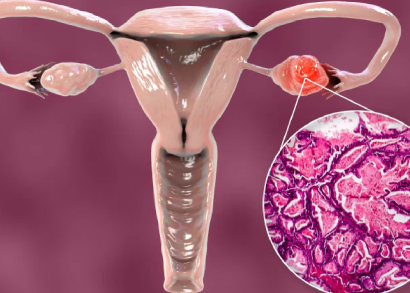What is Ovarian Cancer ?
Ovarian cancer is a growth of abnormal cells that begins in the ovaries. These cells can multiply rapidly and have the potential to invade and destroy healthy tissue.
The female reproductive system includes two ovaries - each about the size of an almond-located on either side of the uterus. These ovaries are responsible for producing eggs as well as hormones like estrogen and progesterone.
Ovarian Cancer Treatment in Gachibowli, Hyderabad typically includes a combination of surgery to remove the cancerous tissue and chemotherapy to kill any remaining cancer cells.
Early detection plays a key role in improving outcomes, but symptoms can be subtle in the early stages, making regular gynecological checkups essential for timely diagnosis and treatment.
 The ovaries, fallopian tubes, uterus, cervix and vagina, also called the vaginal canal, make up the female reproductive system.
The ovaries, fallopian tubes, uterus, cervix and vagina, also called the vaginal canal, make up the female reproductive system.
Symptoms
Signs and Symptoms of Ovarian Cancer
When ovarian cancer first develops, it might not cause any noticeable symptoms. When ovarian cancer symptoms happen, they're usually attributed to other, more common conditions.
Signs and symptoms of ovarian cancer may include:
- Abdominal bloating or swelling
- Quickly feeling full when eating
- Weight loss
- Discomfort in the pelvic area
- Fatigue
- Back pain
- Changes in bowel habits, such as constipation
- A frequent need to urinate
When to See a Doctor
Make an appointment with your doctor if you have any signs or symptoms that worry you.
Causes
It's not clear what causes ovarian cancer, though doctors have identified things that can increase the risk of the disease.
Doctors know that ovarian cancer begins when cells in or near the ovaries develop changes (mutations) in their DNA. A cell's DNA contains the instructions that tell the cell what to do. The changes tell the cells to grow and multiply quickly, creating a mass (tumor) of cancer cells. The cancer cells continue living when healthy cells would die. They can invade nearby tissues and break off from an initial tumor to spread (metastasize) to other parts of the body.
Types of Ovarian Cancer
The type of cell where the cancer begins determines the type of ovarian cancer you have and helps your doctor determine which treatments are best for you. Ovarian cancer types include:
- Epithelial ovarian cancer: This type is the most common. It includes several subtypes, including serous carcinoma and mucinous carcinoma.
- Stromal tumors: These rare tumors are usually diagnosed at an earlier stage than other ovarian cancers.
- Germ cell tumors: These rare ovarian cancers tend to occur at a younger age.
Risk Factors
Factors that can increase your risk of ovarian cancer include:
- Older age: The risk of ovarian cancer increases as you age. It's most often diagnosed in older adults.
- Inherited gene changes: A small percentage of ovarian cancers are caused by gene changes you inherit from your parents. The genes that increase the risk of ovarian cancer include BRCA1 and BRCA2. These genes also increase the risk of breast cancer.
- Several other gene changes are known to increase the risk of ovarian cancer, including gene changes associated with Lynch syndrome and the genes BRIP1, RAD51C, and RAD51D.
- Family history of ovarian cancer: If you have blood relatives who have been diagnosed with ovarian cancer, you may have an increased risk of the disease.
- Being overweight or obese: Being overweight or obese increases the risk of ovarian cancer.
- Postmenopausal hormone replacement therapy: Taking hormone replacement therapy to control menopause signs and symptoms may increase the risk of ovarian cancer.
- Endometriosis: Endometriosis is an often painful disorder in which tissue similar to the tissue that lines the inside of your uterus grows outside your uterus.
- Age when menstruation started and ended: Beginning menstruation at an early age or starting menopause at a later age, or both, may increase the risk of ovarian cancer.
- Never having been pregnant: If you've never been pregnant, you may have an increased risk of ovarian cancer.
